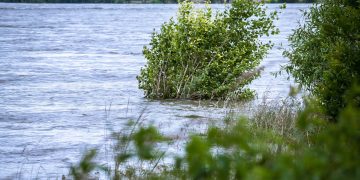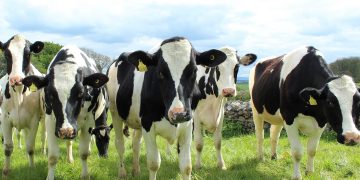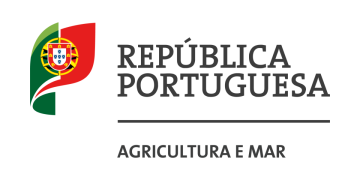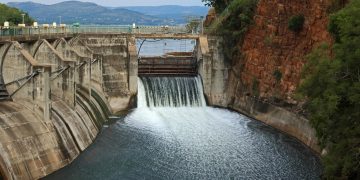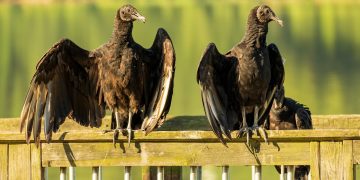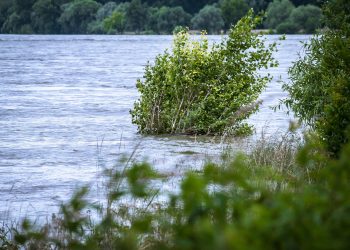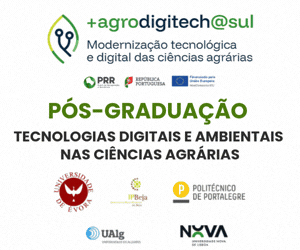In 1998, in a small park in Zurich, Switzerland, one bug woke up in a new world. The bricks on the roof of a local garden, imported from China, had brought with them a hidden guest: a brown marmorated stink bug.
Fast forward to 2024, and the species – Halyomorpha halys – has become an invasive pest, threatening fruit and vegetable crops in Europe.
Thanks to researchers and citizen scientists across Europe, we have a clear picture of where the stink bug is, and this includes countries like Italy, France and Spain. Citizen scientists are members of the public participating voluntarily in the scientific process.
With just a few clicks, Dr Vincent Kalkman from the Naturalis Biodiversity Center in the Netherlands, which works with citizen scientists all over Europe, can track how far the bug has spread.
Kalkman’s work is partly funded by a four-year EU-led research project named MAMBO. The project, which started in 2022, is dedicated to providing “knowledge, tools and infrastructure” for monitoring biodiversity, including the use of cutting-edge technology that relies on sound, vision and AI.
And there is a pressing reason for keeping tabs on biodiversity.
A December 2024 report by the European Environment Agency warned that “Europe’s biodiversity continues to decline at an alarming rate”. It cited intense agriculture and forestry, urbanisation, hunting, invasive species and pollution as the main threats.
“We want to study how well conserved habitats around Europe really are.
Researchers in the project, which runs from 2022 to 2026, are experimenting with tools like drones, cameras and sensors to collect detailed data on different species, while Kalkman focuses on online work.
He uses Observation.org, a global biodiversity platform where people submit pictures of animals and plants, helping to identify and monitor them.
“If you want to know where a species occurs, you could hire people to search everywhere, but that would be nearly impossible and very expensive,” he said.
Instead, he and his colleagues are building AI species identification models to quickly identify species via images. Their 2023 model, rolled out during the project’s first year, already supports Observation.org.
“We’re seeing a dramatic rise in the number of images people submit,” he explained. “We need to consider them all, and these models help us do that.”
Better monitoring of species and habitats
Dr Toke Høye, a professor at the Department of Ecoscience at Aarhus University in Denmark, who coordinates MAMBO, explained that it has two main goals.
One is to improve how we monitor species, particularly invertebrates like bees and beetles. The other is to focus on monitoring habitats.
“We want to study how well conserved habitats around Europe really are,” Høye said.
There are currently 1 840 protected species and 230 protected habitats in the EU. However, at the EU level, only 15% of habitats are in good conservation status and the vast majority are classified as poor or bad.
Høye’s team is developing and implementing new tools for monitoring protected species and habitats. They include sound recognition-based AI, high-resolution habitat maps and site-specific habitat condition metrics.
MAMBO is also creating a virtual lab to efficiently compute vast data streams.
“More data means more people are engaging with nature, which is really positive.
This will significantly improve ecological monitoring in Europe and beyond, and contribute to the EU Biodiversity Strategy for 2030. The strategy, a key part of the European Green Deal, is a long-term plan to protect nature and reverse the degradation of ecosystems.
In 2024, MAMBO research teams began setting up systems at demonstration sites across Europe.
In the Netherlands, for example, researchers are using camera traps to count how many insects of a particular species are in the area. In France, scientists are using drones and satellite data to 3D-map natural reserves and track how they change over time.
“Our goal is to produce yearly maps showing whether habitats are shrinking or expanding,” Høye said.
With this data, MAMBO has the potential to transform how scientists and environmental agencies monitor Europe’s ecological landscape.
The resulting maps and insights could guide policymakers and regulators in implementing the EU Biodiversity Strategy.
Minding the environmental impact of new tech
The infrastructure MAMBO scientists are developing relies heavily on advanced technology. But while innovation and AI tools are crucial for speeding up conservation science, the environmental impact of these efforts must also be considered.
AI’s footprint is significant. Data centres hosting AI servers generate waste, consume large amounts of water and require plenty of electricity.
Høye is aware of this and emphasises that AI’s impact will be assessed.
“In the second half of the project, we’ll spend time understanding the cost of the tools we’re using,” he said. “We’ll look at not just the hardware and energy use, but also the environmental footprint of the AI models themselves.”
Kalkman shares this concern, but remains optimistic about technology’s role in connecting people with nature.
“It’s not just that we’re getting more data from citizen scientists,” he said. “More data means more people are engaging with nature, which is really positive.”
Research in this article was funded by the EU’s Horizon Programme. The views of the interviewees don’t necessarily reflect those of the European Commission. If you liked this article, please consider sharing it on social media.
O artigo foi publicado originalmente em Horizon, the EU Research and Innovation Magazine.

